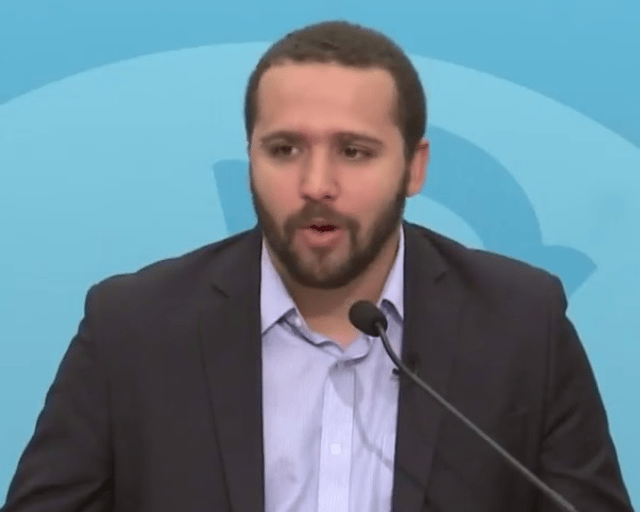Wesley Lowery

Wesley Lowery

Wesley Lowery | |
|---|---|
| Education | Ohio University |
| Occupation | Journalist |
| Employer | The Washington Post |
Notable work | "Fatal Force" project; They Can't Kill Us All: Ferguson, Baltimore, and a New Era in America's Racial Justice Movement |
| Home town | Cleveland, Ohio |
| Awards | Pulitzer Prize for National Reporting (2016) |
| Website | www.washingtonpost.com/people/wesley-lowery [23] |
Wesley Lowery (born 1990) is a journalist at The Washington Post. He was a lead on the Post's "Fatal Force" project that won the Pulitzer Prize for National Reporting in 2016 as well as the author of They Can't Kill Us All: Ferguson, Baltimore, and a New Era in America's Racial Justice Movement (Little, Brown, 2016). In 2017, he became a CNN political contributor.[1]
Wesley Lowery | |
|---|---|
| Education | Ohio University |
| Occupation | Journalist |
| Employer | The Washington Post |
Notable work | "Fatal Force" project; They Can't Kill Us All: Ferguson, Baltimore, and a New Era in America's Racial Justice Movement |
| Home town | Cleveland, Ohio |
| Awards | Pulitzer Prize for National Reporting (2016) |
| Website | www.washingtonpost.com/people/wesley-lowery [23] |
Early life
Lowery attended Shaker Heights High School and Ohio University.[2] During college, Lowery was editor-in-chief of the campus newspaper, The Post, and interned at The Detroit News, The Columbus Dispatch, and The Wall Street Journal.[3]
Career
Lowery was a reporting fellow at the Los Angeles Times, then moved to the Boston Globe, becoming a general assignment political reporter in 2013[4] and covered topics including the murder trial of the NFL's Aaron Hernandez, Boston’s mayoral race, and the manhunt for the Boston marathon bombers.[5]
In 2014, the National Association of Black Journalists named Lowery "Emerging Journalist of the Year".[6] Lowery moved to the Washington Post in 2014; The Washingtonian described him in 2015 as the paper's "rising star...a terrific reporter" with a track record for "establishing deep sources, writing colorful solo pieces, and contributing to team coverage."[5]
Ferguson coverage and arrest
In August 2014, Lowery covered the Ferguson protests for The Post. On August 13, Lowery and Huffington Post reporter Ryan Reilly were arrested in a McDonald's. Journalism groups as well as Lowery's and Reilly's employers condemned the arrests, saying they were, as the Columbia Journalism Review characterized it, "deliberate and unjustifiable attempts to interfere with the press."[7] A year later, shortly before the statute of limitations was set to expire, St. Louis County prosecutors charged Lowery and Reilly with trespassing and interfering with a police officer.[8] In May 2016, prosecutors dropped all charges against Reilly and Lowery in exchange for an agreement that the reporters would not sue the county.[9]
Fatal Force project
Lowery was a lead on the Post's "Fatal Force" project,[10][11] a database that tracked 990 police shootings in 2015.[12] At the time, the federal government had no comprehensive, nationwide data on police killings;[13] the most systematic data available came from databases compiled by independent, grassroots organizations like Fatal Encounters, Stolen Lives Project, Operation Ghetto Storm, and Killed by Police.[14] Drawing on these databases as well as local newspaper reports, law enforcement websites and social media, Lowery and colleagues built out the Post's Fatal Force database. The project won the Pulitzer Prize for National Reporting in 2016,[15] and the Justice Department announced a pilot program to begin collecting a more comprehensive set of use-of-force statistics in 2017.[16]
They Can't Kill Us All
Lowery's first book They Can't Kill Us All: Ferguson, Baltimore, and a New Era in America's Racial Justice Movement was published November 15, 2016 by Little, Brown.[17] The book describes the Black Lives Matter movement in the context of U.S. history as well as Lowery's personal history. The Seattle Times listed it as among the fall releases they "can't wait to read".[18] The Boston Globe said Lowery "offers fresh insights into what it means to cover a broad national story about race in a rigorous and sustained way."[19] Noting that Lowery wrote the book at 25, The New York Times said, "His book is electric, because it is so well reported, so plainly told and so evidently the work of a man who has not grown a callus on his heart."[20]
Lowery won the 2017 Christopher Isherwood prize for autobiographical prose from the Los Angeles Times Book Prizes for They Can't Kill Us All.[21]